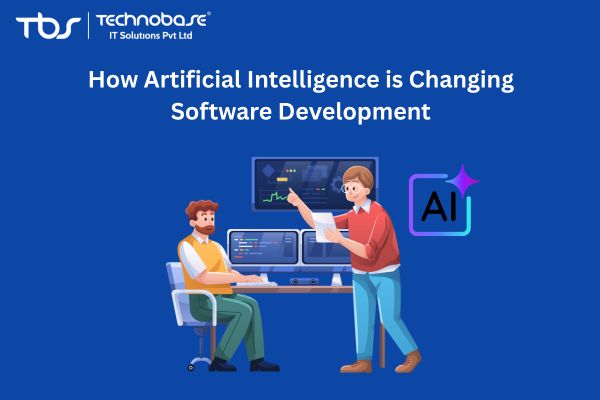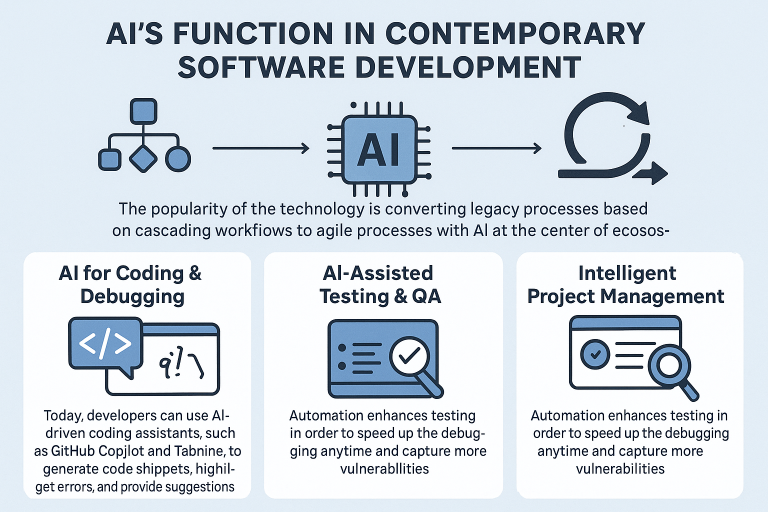How AI is Transforming Software Development in 2025
The landscape of software development has undergone a revolutionary transformation in 2025, with artificial intelligence emerging as the driving force behind unprecedented innovation. As businesses worldwide embrace digital transformation, AI in software development has become not just an advantage but a necessity for staying competitive in today's rapidly evolving technological ecosystem.

The Current State of AI Software Solutions
AI software solutions have fundamentally altered how developers approach coding, testing, and deployment processes. Machine learning algorithms now assist programmers in writing cleaner code, identifying potential bugs before they manifest, and optimizing performance automatically. This shift represents a paradigm change from traditional development methodologies to AI-augmented programming environments.
The integration of large language models and specialized AI tools has created an ecosystem where developers can focus on high-level problem-solving while AI handles routine coding tasks. This collaboration between human creativity and artificial intelligence has resulted in faster development cycles and higher-quality software products.
Modern AI development platforms can generate substantial portions of code based on natural language descriptions, dramatically reducing the time required for initial development phases. These systems understand context, maintain coding standards, and even suggest architectural improvements, making them invaluable partners in the software creation process.
Major AI Technologies Driving Transformations in 2025

AI enabled technologies are changing the landscape for developers:
Machine Learning & Predictive Analytics
Machine Learning analyzes usage patterns, predicts system failure, builds intelligent software the can improve itself, and suggests improvements.
Generative AI for Code Creation
Generative AI enables developers to write functional code from natural language prompts, saving time on boring stuff, and enabling faster software release dates.
Natural Language Processing (NLP)
NLP has developed to convert technical language into easy to understand formats. This technology also allows developers to interact with systems using plain English.
AI DevOps Automation
AI is automating the DevOps process with deploying automation, real-time monitoring, and predictive maintenance. Overall, technologies will allow more seamless releases in a shorter timeframe with uptime.
The Future of AI in Software Development
Looking ahead, AI in software development will evolve to include predictive capabilities that can anticipate user needs, suggest feature enhancements, and automatically optimize applications based on usage patterns. This predictive approach will enable developers to create more intuitive and user-friendly applications.
The combination of AI with low-code and no-code platforms is democratizing software development, allowing business users to create sophisticated applications without extensive programming knowledge. AI assistants guide users through the development process, suggesting optimal solutions and ensuring best practices are followed.
Future AI software solutions will continuously learn from codebases, user interactions, and deployment patterns to improve their recommendations and automation capabilities. This continuous learning approach will make AI development tools increasingly sophisticated and valuable over time.
Benefits of AI-Driven Software Development
Development teams using AI tools report significant productivity gains, with some organizations experiencing up to 40% faster development cycles. AI handles routine tasks, allowing developers to focus on creative problem-solving and innovation.
AI-assisted development results in more reliable software with fewer bugs and security vulnerabilities. Automated code analysis and testing ensure that applications meet high-quality standards consistently.
AI-assisted development results in more reliable software with fewer bugs and security vulnerabilities. Automated code analysis and testing ensure that applications meet high-quality standards consistently.
Challenges and Considerations
As AI becomes more prevalent in software development, organizations must invest in training their development teams to work effectively with AI tools. This includes understanding how to leverage AI capabilities while maintaining human oversight and creativity.
Implementing AI software solutions requires careful planning and integration with existing development workflows. Organizations must consider compatibility, data privacy, and security implications when adopting AI tools.
Best Practices for AI Implementation
Organizations should begin with specific use cases and gradually expand AI implementation as teams become more comfortable with the technology. This approach minimizes disruption and allows for better change management.
While AI can automate many tasks, human oversight remains crucial for ensuring quality, creativity, and alignment with business objectives. The most successful implementations combine AI efficiency with human judgment.
Conclusion
We have already established that AI is not just hypothetical in the future, it is real and already being used in the software development process. AI now generates the code, automated the testing process/rest of the testing process, and secures our applications - create whole new ways to innovate and scale as a business. Businesses that embrace using AI in their business processes now will soon be the standard that others must follow to stay in competition.
At Technobase we only focus on AI software solutions so we can keep moving forward with our organization, and definitely stay ahead of the curve. If your organization is seeking its own custom AI integration, SaaS solutions or enhanced CRM and chatbots, we would love to help you take that next step.
Contact us Now! Technobase IT Solutions for Customisable Software Development.
